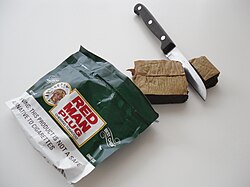| This article contains promotional content. Please help improve it by removing promotional language and inappropriate external links, and by adding encyclopedic text written from a neutral point of view. (March 2020) (Learn how and when to remove this message) |
| [REDACTED] | |
| Company type | Private |
|---|---|
| Industry | Chewing tobacco |
| Founded | 1904; 121 years ago (1904) |
| Headquarters | Owensboro, Kentucky, United States |
| Website | americasbestchew.com |

America's Best Chew (formerly Red Man) is an American brand of chewing tobacco introduced in 1904.
Red Man traditionally came as leaf tobacco, in contrast to twist chewing tobacco or the ground tobacco used in snuff. It is made by the Pinkerton Tobacco company of Owensboro, Kentucky. In 1985, Pinkerton was acquired by a Swedish corporation, and after further corporate reshuffling, the brand now falls under the umbrella of the Swedish Match company, which in turn is owned primarily by institutional investors. The proportion owned by non-Swedish investors is approximately 80%.
History
The Red Man brand was introduced in 1904 by Pinkerton Tobacco (incorporated in 1901).
Red Man was initially sold in a few Midwestern states; it expanded in 1954 into the South, and then in 1963 largely nationwide. The corporation's marketing material describes Red Man's consumer base: "A large number of consumers work outdoors and enjoy hunting, fishing and watch auto racing." Contemporary materials from Swedish Match also suggest that the brand name came from something of an homage to American Indians.
In January 2022, parent company Swedish Match announced that they would be changing brand's name to "America's Best Chew" and removing the depiction of a Native American chief on its packaging.
Advertising
Early in its history, Red Man advertisements were painted on the sides of barns, featuring an endorsement from baseball player Nap Lajoie: "Lajoie chews Red Man, ask him if he don't." During the 1920s and 30s, the company sponsored a professional basketball team – the Toledo Red Man Tobaccos. Marketing tie-ins with rural and outdoor sports have been a hallmark of the Red Man brand. From 1952 to 1955, Red Man produced a series of baseball cards, the only tobacco company to do so after 1920. The sets are valuable due to the appearance of 25 of the top players of 1952–55, including Stan Musial, Yogi Berra and Willie Mays.
In 1982, Red Man launched its first TV advertising ever, produced by the ad agency Benton & Bowles. This decision came after Levi Garrett's aggressive entrance into the chewing tobacco market in the United States.
Since then, the brand has sponsored competitive events including the "Red Man All-American Pulling Series", a tractor pulling circuit, and the "Red Man All-American Bass Championship", a fishing competition. In 1991, under pressure from the Federal Trade Commission, which was enforcing a 1986 U.S. statute banning television ads for smokeless tobacco, Red Man agreed to stop displaying its "product logo, selling message or the color or design of the tobacco product or its package" during televised coverage of the tractor pulls. The competitive fishing circuit that culminated in the Bass Championship was sponsored by the company and called the "Red Man Tournament Trail" from 1983 to 2000, after which Walmart took over as the name sponsor.
Flavors and varieties

- Golden Blend
- Select
- America's Best Chew Silver Blend
- Original
- Plug
Dipping tobacco
- America's Best Chew Cut Natural
- America's Best Chew Long Cut Straight
- Red Man Long Cut Wintergreen (discontinued in 2021)
References
- ^ History of chewing tobacco Archived 2009-02-14 at the Wayback Machine. Swedish Match. Retrieved July 15, 2006.
- Annual Report 2005 Archived 2007-02-06 at the Wayback Machine, page 6, retrieved February 16, 2007.
- "Red Man – the flagship of chewing tobacco". Swedish Match. Archived from the original on 2018-06-30. Retrieved 2023-09-19.
- "Iconic chewing tobacco brand Red Man is changing its name and getting rid of its Native American imagery". 20 January 2022.
- Nunberg, Geoffrey (2001). The Way We Talk Now: Commentaries on Language and Culture. Houghton Mifflin Reference. p. 32. ISBN 0-618-11603-6.
- Zoss, Joel; Bowman, John (2004). Diamonds in the Rough: The Untold History of Baseball. University of Nebraska Press. p. 18. ISBN 0-8032-9920-6.
- Dougherty, Philip (1982). "Advertising; Red Man Tobacco Tries TV". New York Times. Retrieved 30 June 2018.
- ^ "Chewing Tobacco Ads to Be Less Obvious". New York Times. 1991-10-31. Retrieved 2006-07-15.
- "Arizona's Baldwin Takes First Day Lead in Red Man All-American Bass Championship". Major League Fishing. June 18, 1999. Retrieved September 19, 2023.
- "Twelve Red Man bass divisions hold super events". Boats.com / Operation Bass. 2000-09-05. Archived from the original on August 29, 2005. Retrieved 2006-07-01.
External links
- Shorpy A photograph of outdoor advertising in Camden, NJ, 1939, showing the Red Man brand.